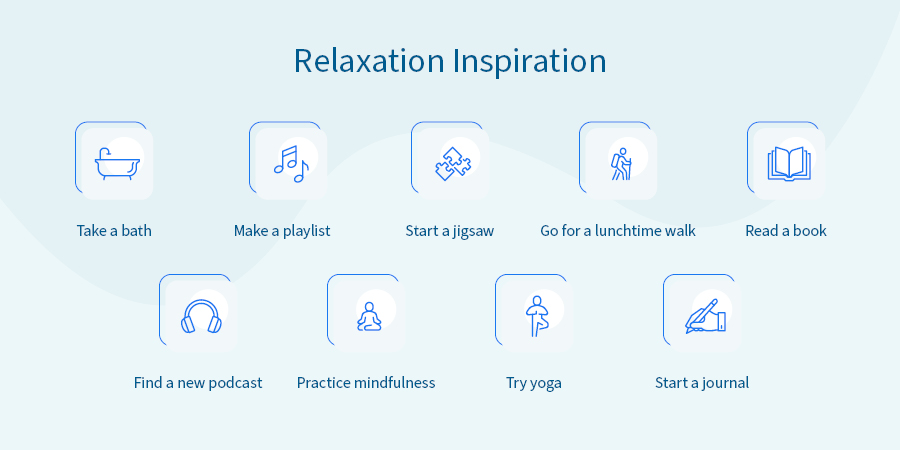With the demands of everyday life, it can sometimes feel impossible to carve out time for yourself to rest and recharge. This guide looks at practical ways to introduce a little relaxation time each day into your routine.
What are the benefits of relaxation?
Relaxation can help us to relieve tension in the mind and body, giving us the opportunity to unwind and rest. It can help us retain a sense of balance, supporting our mental and physical wellbeing. Studies suggest that regular, effective relaxation can have a positive impact on our health by:
- Lowering heart rate
- Supporting the digestive system
- Helping tiredness and fatigue
- Regulating blood sugar levels
- Giving more clarity, improving concentration
- Supporting good quality sleep
- Regulating breathing rate
- Easing feelings of stress and anxiety
What does relaxation mean to me?
One of the best things about relaxation is that it’s completely personal to you. We’re all individuals, so what works for one person could look different for someone else. Some of us might prefer active relaxation activities like walking, yoga or other gentle exercises that can calm the mind while engaging the body. Other soothing activities that are less physical include reading a book, listening to a podcast, or doing a jigsaw.
How can I practice relaxation each day?
It may be that you can adapt an activity that’s already part of your daily routine. For example, if you walk the dog each morning, you could use the walk to try mindfulness. Mindfulness is the practice of being more aware of our surroundings. It involves using our senses to take in what we can see, hear, smell, taste, and touch. The NHS recommends mindfulness to help us cope when we feel overwhelmed or anxious. By being more aware and connected to what’s around us, the idea is that we become more tuned in to this and less consumed by any negative thoughts and feelings we’re experiencing.
If a walk each day isn’t possible, you might want to read a chapter of your book each evening before you go to sleep. This can be a great alternative to scrolling through your phone just before bed and help promote a better-quality night’s sleep. If your daily routine involves travelling, make a playlist featuring your favourite songs or subscribe to a podcast on a topic you want to learn more about. If you struggle for time throughout the day, swap your evening shower for a bath. Submerging yourself in warm water can help ease aching muscles and give you the opportunity to wind down before bed.

How can I stick to my goal of daily relaxation?
Make it a habit by starting small and gradually building up. It might be that you start with one page of your book before bed and work up to a chapter. Like with any goal, committing to daily relaxation will take practice and repetition. Introducing it into an existing daily activity will make this easier to achieve. Don’t be hard on yourself if you miss days. It takes time and patience to achieve consistency. Each day you manage to carve out some time to do something you find relaxing is a success. You could use a calendar to record your progress so you can easily see how you’re getting on. If your first choice of activity isn’t working too well, don’t be afraid to try something different until you find something that fits well with your day-to-day routine.
